Details can be found on the Meeting Page.
QUISCO Meeting 3/4/2019, Heriot-Watt
Heriot-Watt University, Earl Mountbatten Building, EM1.83
| Time | Event |
| 0945-1000 | Arrival |
| 1000-1010 | Welcome (AF) |
| 1010-1040 | Processing quantum information in disordered media by wavefront shaping, Hugo Defienne, Glasgow University |
| 1040-1110 | Rejecting observer-independence in quantum theory, Alexander Pickston, Heriot-Watt |
| 1110-1125 | Break |
| 1125-1210 | Quantum Photonics using 2D materials (invited), Vinod Menon, IEEE distinguished lecturer 2019, City University of New York |
| 1210-1230 | Quantum dots in two-dimensional heterostructures, Mauro Brotons Gisbert, Heriot-Watt |
| 1230-1315 | Lunch Break |
| 1315-1415 | Lab tours (optional) & “Open space” discussion |
| 1415-1435 | Cooling of impurity atoms by a reservoir gas, Rosaria Lena, Strathclyde |
| 1435-1455 | Ancilla controlled quantum computation for discrete and continuous variable hybrid systems, Viktor Nordgren, St Andrews |
| 1455-1515 | Sampling matching and its applications in verification, Niraj Kumar, Edinburgh University |
| 1515-1530 | Break |
| 1530-1550 | Skyrmion structure in vector beams, Scarlett Gao, Glasgow University |
| 1550-1610 | Generative Machine Learning, Brian Coyle, Edinburgh University |
| 1610-1630 | Quantum E-voting, Nikolas Lamprou, Edinburgh University |
| 1630 | Closing remarks (AF) and potential campus pub visit |
QUISCO Meeting 20/06/2018, Glasgow
The next QUISCO meeting will take place at the University of Glasgow on Wednesday 20th June 2018, from 10am to 5pm.
More details to follow.
For further information or if you are interested giving a talk, please contact Sarah Croke (sarah [dot] croke [at] glasgow [dot] ac [dot] uk)
QUISCO Meeting 30/01/2018, Edinburgh
The first QUISCO meeting for 2018 will take place at the University of Edinburgh, School of Informatics on Tuesday 30th January 2018, from 10am to 5pm. The venue will be at Informatics Forum (link), 4th floor at Mini Forum 2 (room 4.40).
More details can be found here.
For further information or if you are interested giving a talk, please contact Petros Wallden (petros [dot] wallden [at] gmail [dot] com)
QUISCO Meeting 16/6/2017 St Andrews
The next QUISCO meeting will be held at St Andrews on Friday 16th June 2017. Details can be found here.
QUISCO Meeting 4/12/2015
The next QUISCO meeting will take place at the University of Glasgow on Friday 4th December 2015, details here.
QUISCO Meeting 8/12/2014
There will be a QUISCO meeting in Edinburgh Informatics on Monday 8th December 2014, details here.
QUISCO Does Christmas 10/12/2013
We are having our Christmas QUISCO meeting in St. Andrews on Tuesday 10th December. The meeting is going to have a light Christmas atmosphere of introducing new people who has joined us in the recent time. We will have a number of talks, less technical this time but introducing new research topics in quantum information.
The meeting programme is now available.
If you would like to attend, please email Dr Natalia Korolkova for catering purposes.
Charles Bennett to Visit Scotland
 Dr Charles Bennett will be visiting Edinburgh from November 17 and will deliver the Informatics Distinguished Lecture on:
Dr Charles Bennett will be visiting Edinburgh from November 17 and will deliver the Informatics Distinguished Lecture on:
Tuesday 19th November at 16.00
Room G.07, School of Informatics
Abstract: The information revolution is based on what a physicist would call a classical view of information. Quantum effects were long regarded as a mere nuisance for information processing, preventing information in microscopic objects from being observed or copied accurately, but are now known to make possible feats like quantum cryptography and, if a quantum computer can be built, dramatic speedups of some computations. More importantly, the quantum approach has led to a more coherent and powerful way of thinking about information.
We review this approach, especially the uniquely strong and private kind of correlation known as entanglement, which plays a role in many ways complementary to classical information. Entanglement helps explain the origin of randomness, why the future is more uncertain than the past, and, paradoxically, the macroscopic world’s superficially classical appearance, which allowed quantum laws to remain undiscovered until the 20th century.
QUISCO at the IOP 17-18/12/2012
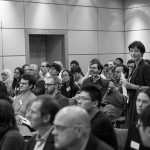 Many QUISCO representatives were presenting at the Institute of Physics Meeting on Quantum Technologies in London 17-18th December 2012. Researchers from Glasgow, Strathclyde, Heriot-Watt and Edinburgh universities gave both invited and contributed lectures on their latest results.
Many QUISCO representatives were presenting at the Institute of Physics Meeting on Quantum Technologies in London 17-18th December 2012. Researchers from Glasgow, Strathclyde, Heriot-Watt and Edinburgh universities gave both invited and contributed lectures on their latest results.
Daniel Oi (Strathclyde) gave an overview of current efforts on performing entanglement experiments in space using CubeSats, extremely small satellites but with advanced capabilities.
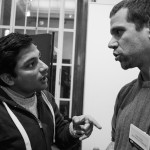 Vedran Dunjko (Heriot-Watt, right) presented experimental results implementing quantum digital signatures, a method by which “quantum cheques” could be signed and verified.
Vedran Dunjko (Heriot-Watt, right) presented experimental results implementing quantum digital signatures, a method by which “quantum cheques” could be signed and verified.
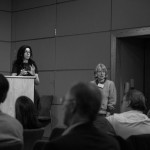 Sabrina Maniscalco (Heriot-Watt, left) showed how a particular form of quantum noise, Non-Markovianity, could be characterised and even used as a diagnostic tool.
Sabrina Maniscalco (Heriot-Watt, left) showed how a particular form of quantum noise, Non-Markovianity, could be characterised and even used as a diagnostic tool.
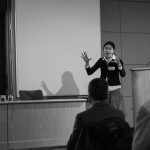 Jacqi Romero (Glasgow, right) explained the phenomenon of orbital angular momentum of light and recent experimental progress on its production and manipulation.
Jacqi Romero (Glasgow, right) explained the phenomenon of orbital angular momentum of light and recent experimental progress on its production and manipulation.
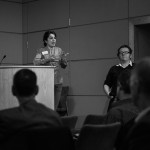 Elham Kashfi (Edinburgh, left) gave an invited talk on the verification of quantum computers. This combines cryptographic secrecy with quantum computation to allow the secure operation of quantum servers. More generally, it tries to answer the question of how do we make sure our quantum devices are performing as promised.
Elham Kashfi (Edinburgh, left) gave an invited talk on the verification of quantum computers. This combines cryptographic secrecy with quantum computation to allow the secure operation of quantum servers. More generally, it tries to answer the question of how do we make sure our quantum devices are performing as promised.
Besides talks, QUISCO members also showed posters presenting their varied research. More photos of the event can be found here.